Rachel Barenblat's Blog, page 148
September 13, 2014
A poem for #blogElul 13: Pray
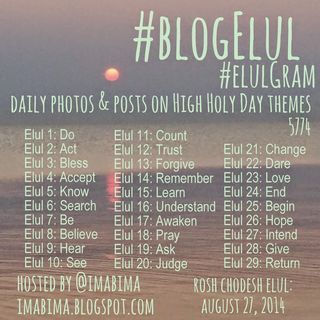 PRAY (ELUL 18)
PRAY (ELUL 18)
What does the deepest mirror show?
Thank you for this moment; I'm alive.
--who I'm speaking to I'll never know.
What does the deepest mirror show?
My soul the ocean where I daily dive.
Yield into the moment and let go.
What does the deepest mirror show?
Thank you. For this moment, I'm alive.
The Hebrew word "to pray," l'hitpallel, is a reflexive verb which connotes introspection and self-examination.
This poem is a triolet. The form requires the use of repeated lines. I liked the idea of repeating lines in this poem, since daily Jewish prayer is liturgical and does involve some repetition. My hope is that each repeated line feels different the second or third time it appears, just as each repeated prayer in our liturgy can feel different at different moments in the day or in a week or in a life.
I'm participating again this year in #blogElul, an internet-wide carnival of themed posts aimed at waking the heart and soul before the Days of Awe. (Organized by Ima Bima.) You can read last year's and this year's #blogElul posts via the Elul tag; last year's posts are also available, lightly revised, in the print chapbook Elul Reflections.
September 12, 2014
A poem for #blogElul 17: Awaken
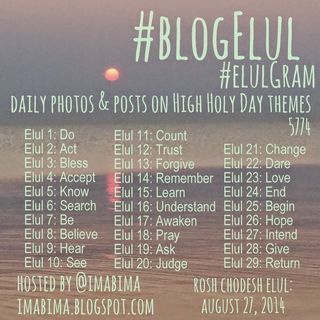 AWAKEN (ELUL 17)
AWAKEN (ELUL 17)
Suddenly everything is new.
And these eyes
can't widen far enough
to take in the universe
contained in your heart
spanned with your hands.
There is no word
which means red and green
at the same time
but the apple
cupped in this palm
sings it joyously.
Time eddies and swirls
like the exuberant river.
The new year, the old year
the new year again.
Every instant precious
and then gone.
This poem arose out of the experience of holding a beautiful fresh apple, one of the varieties which is mottled red and green when ripe. I thought I remembered learning at some point that "cinnabar" meant both red and green, but it doesn't; it just means red. And then I thought: there's no word for that, but this apple is manifesting it anyway. It felt like a tiny moment of awakening. Hence the poem.
Shabbat shalom to all!
I'm participating again this year in #blogElul, an internet-wide carnival of themed posts aimed at waking the heart and soul before the Days of Awe. (Organized by Ima Bima.) You can read last year's and this year's #blogElul posts via the Elul tag; last year's posts are also available, lightly revised, in the print chapbook Elul Reflections.
September 11, 2014
A poem for #blogElul 16: Understand
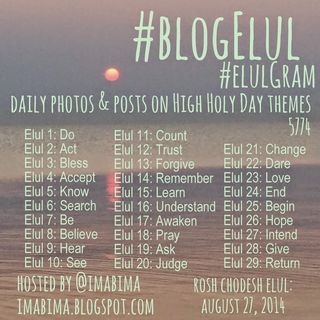 UNDERSTAND (ELUL 16)
UNDERSTAND (ELUL 16)
Why sickness, why children
cringing from a blow
or broken by bombs, these
will never make sense.
Why cruelty. Why bar
anyone from the common table.
The sages say the world
was broken from the get-go,
too fragile a vessel
for God's infinite light, but
how can I listen to the news
without shattering further?
Our prayers talk about
who by fire, who by water.
It's the wrong question.
When will we rewrite
the words? The book of life
reads from itself, remember,
and inside is the name
of every living being
no matter our politics.
Our time here is so brief.
Scatter love like seeds.
Stop trying to understand.
I've been trying to draft each day's #blogElul poem a few days in advance so that the poems can benefit from a bit of revision before they go live. I wrote this one some days ago, not realizing that the 16th of Elul was going to correspond to September 11th on the Gregorian calendar. The confluence seems appropriate, though.
I'm participating again this year in #blogElul, an internet-wide carnival of themed posts aimed at waking the heart and soul before the Days of Awe. (Organized by Ima Bima.) You can read last year's and this year's #blogElul posts via the Elul tag; last year's posts are also available, lightly revised, in the print chapbook Elul Reflections.
September 10, 2014
A poem for #blogElul 15: Learn
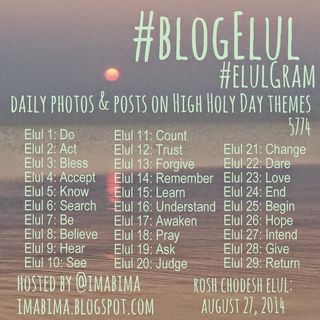 LEARN (ELUL 15)
LEARN (ELUL 15)
Sun, can you teach me to gild
everything I see? Leaves,
how to flutter with awe?
Ground beneath my feet
don't let me go yet
I want to learn gravity.
Lenses in frames, I want
to learn not to mistake glass
for the view.
And you: convince me
that trying to be good is enough.
That lesson keeps eluding me.
Source of mercy, untie
my tangles: help me learn
when to hold on, when to let go.
The line "source of mercy, untie my tangles" is Reb Zalman's translation of the first line of ana b'koach, a prayer which I love.
I'm participating again this year in #blogElul, an internet-wide carnival of themed posts aimed at waking the heart and soul before the Days of Awe. (Organized by Ima Bima.) You can read last year's and this year's #blogElul posts via the Elul tag; last year's posts are also available, lightly revised, in the print chapbook Elul Reflections.
September 9, 2014
A poem for #blogElul 14: Remember
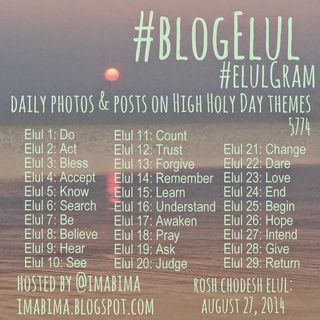 REMEMBER (ELUL 14)
REMEMBER (ELUL 14)
And what if I can't remember
who I've been, what other faces
I've worn beneath the wheeling stars?
Then make up a true story.
Look at who you are now
and work backwards. Every choice
a course correction
from how you once went astray.
Set aside cynicism, let yourself believe
the soul chooses its companions.
What then? How would that shift
the way you look at the person beside you?
Let your voice take on a new lilt.
Let the tide roll out again.
Remember your truest name,
the one no mortal voice can speak.
I'm participating again this year in #blogElul, an internet-wide carnival of themed posts aimed at waking the heart and soul before the Days of Awe. (Organized by Ima Bima.) You can read last year's and this year's #blogElul posts via the Elul tag; last year's posts are also available, lightly revised, in the print chapbook Elul Reflections.
September 8, 2014
A poem for #blogElul 13: Forgive
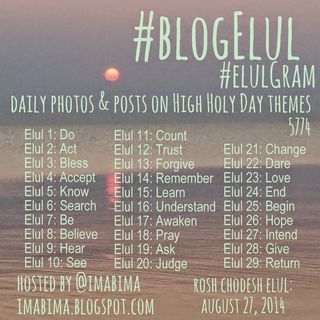 FORGIVE (ELUL 13)
FORGIVE (ELUL 13)
All my excuses.
Acting as though
I mattered more
than you do.
The times when
I pretended I
couldn't see you.
The days when
I didn't bother
wrapping my hand
in the memory
of our connection.
Not my changes --
we both know
standing still isn't
a real option
-- but the things
I didn't say.
Letting myself pretend
I had time
enough to dally.
As though this
rise and fall
would last forever.
I'm participating again this year in #blogElul, an internet-wide carnival of themed posts aimed at waking the heart and soul before the Days of Awe. (Organized by Ima Bima.) You can read last year's and this year's #blogElul posts via the Elul tag; last year's posts are also available, lightly revised, in the print chapbook Elul Reflections.
September 7, 2014
Ki Tetzei: on right relationship with each other
Here's the d'var Torah I offered at my shul yesterday. (More or less -- when I offered it aloud, I extemporized and added some bits, but this is where it started out.) (Cross-posted to my From the Rabbi blog.)
This week's Torah portion is filled with instructions. Here are some of them which speak most to me this year (lightly paraphrased):
If someone works for you, pay them right away. You never know when someone might need payment desperately. Don't shame them by making them ask.
This is a time of year when requests for dues abatements and Hebrew school tuition abatements come across my desk. These verses in Torah remind me how important it is to respond to these requests lovingly.
If someone's children misbehave, try not to judge the parents. Give them the benefit of the doubt. Parenting can be difficult.
If someone's parents have done wrong, try not to judge the children. We are not responsible for the actions of those who came before us.
When the Torah speaks of not putting people to death for the sins of their parents or children, I hear a message about the importance of responding to people with generosty of spirit.
Maintain perspective about the difference between wants and needs. Remember that you don't need to own everything. Practice sufficiency.
Whatever abundance comes your way, be sure to share it. Cultivate a sense of trust in the universe which will allow you to give freely.
Though most of us no longer have fields or vineyards in which those who are hungry may glean, we can still choose to share with others, and to train ourselves to trust that we don't need to hold on to everything for ourselves.
Always remember the hard places and tight straits which you have known, and let those memories impel you to kindness and generosity.
We're almost halfway through with the month of Elul. This is the month during which we prepare ourselves for the coming Days of Awe. This is a time of teshuvah, the spiritual work of re-orienting ourselves in the right direction again.
One tradition teaches that we should seek to repair our relationships with each other during Elul, so that during the ten days between Rosh Hashanah and Yom Kippur we can focus on repairing our relationship with our Source.
The mitzvot enumerated in this week's Torah portion are mitzvot bein adam l'chavero, mitzvot between people. Directions for right action in our relationships with each other.
May we be strengthened in our intentions and in our practice. May these mitzvot become engrained in us, engraved in us, channels through which our behaviors naturally flow. Kein yehi ratzon.
A poem for #blogElul 12: Trust
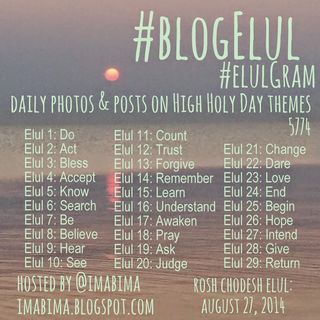 TRUST (ELUL 12)
TRUST (ELUL 12)
How to trust
the one who
holds the universe
gluons to galaxies
who can speak
creation's own language,
past present future
all at once?
It's almost laughable
my bounded mind
reaching out to
touch bright infinity.
Can I believe
none of us
is ever insignificant
in those eyes?
I'm pretty sure I borrowed the "from gluons to galaxies" image from Reb Zalman, may his memory be a blessing.
I'm participating again this year in #blogElul, an internet-wide carnival of themed posts aimed at waking the heart and soul before the Days of Awe. (Organized by Ima Bima.) You can read last year's and this year's #blogElul posts via the Elul tag; last year's posts are also available, lightly revised, in the print chapbook Elul Reflections.
September 6, 2014
A poem for #blogElul 11: Count
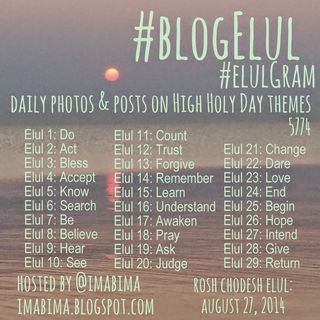 COUNT (ELUL 11)
COUNT (ELUL 11)
September ticks by. Count
your way through. It's time
to get the year's bill, measure
what the soul has spent. Turn
over your hands, see each day
marked on your palms anew.
Remember sharpened pencils, new
backpacks, how you would count
the hours of school's first day?
When we learn to resent time
an Eden is lost, a turn
we can't undo or measure.
Now how do you measure
your heart's response to new
beginnings? And in turn
do you remember to count
kindness given or received, time
to pause and breathe each day?
This is the day
that God has made: let us measure
ourselves against the marks time
has drawn on the doorframe. New
means that "before" doesn't count:
consult the old maps, turn
toward your yearnings. Return
to a clean slate each day.
Stop, this instant, to count
blessings. Who could measure
the gift of your body made new,
trees shifting colors, time
eddying like a river? It's time
to forgive yourself. Turn
around and make it new.
The sages say repent the day
before death, but who can measure
what's left in the glass? Count
your time a gift every day.
Turn toward mercy. Take the measure
of your soul anew. Make it count.
Today's poem takes me back to one of my favorite poetic forms, the sestina. (There's a whole sestina category at this blog, because I've posted so many of them over the years.) This form, which relies on six repeated end-words, seemed appropriate for today's prompt.
I'm participating again this year in #blogElul, an internet-wide carnival of themed posts aimed at waking the heart and soul before the Days of Awe. (Organized by Ima Bima.) You can read last year's and this year's #blogElul posts via the Elul tag; last year's posts are also available, lightly revised, in the print chapbook Elul Reflections.
September 5, 2014
A poem for #blogElul 10: See
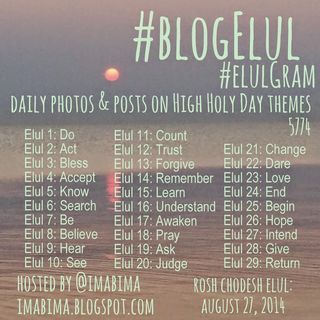 SEE (ELUL 10)
SEE (ELUL 10)
beyond brand labels
beyond the face I've learned
to cultivate
beyond the words I drip
like honey from an apple wedge
I want you to see me
see my missteps
and love me anyway
fiercely as the earth
loves the star it circles
inexorably as the tide
that rises and falls
on the mountain of God
there is vision
I am seen, I am afraid
made in your image, I see
you everywhere
when I open my eyes
Don't we all yearn to be truly seen for who we most deeply are? And, more than that, to be accepted and loved in the wholeness of our being?
Toward the end of the story of the akedah, the binding of Isaac (about which I wrote a poem cycle some years ago), we read that Avraham named that mountaintop "God Sees." Torah continues "as it is said until this day, 'On the mountain God is seen.'" There's a bit of an aural Hebrew pun which is lost in translation; the word-root denoting seeing is very like the word-root denoting awe or fear of God. Perhaps one might also say "on the mountain God inspires awe." Or maybe it is the act of seeing and being seen which evokes awe.
Shabbat shalom to all.
I'm participating again this year in #blogElul, an internet-wide carnival of themed posts aimed at waking the heart and soul before the Days of Awe. (Organized by Ima Bima.) You can read last year's and this year's #blogElul posts via the Elul tag; last year's posts are also available, lightly revised, in the print chapbook Elul Reflections.
Rachel Barenblat's Blog
- Rachel Barenblat's profile
- 6 followers



